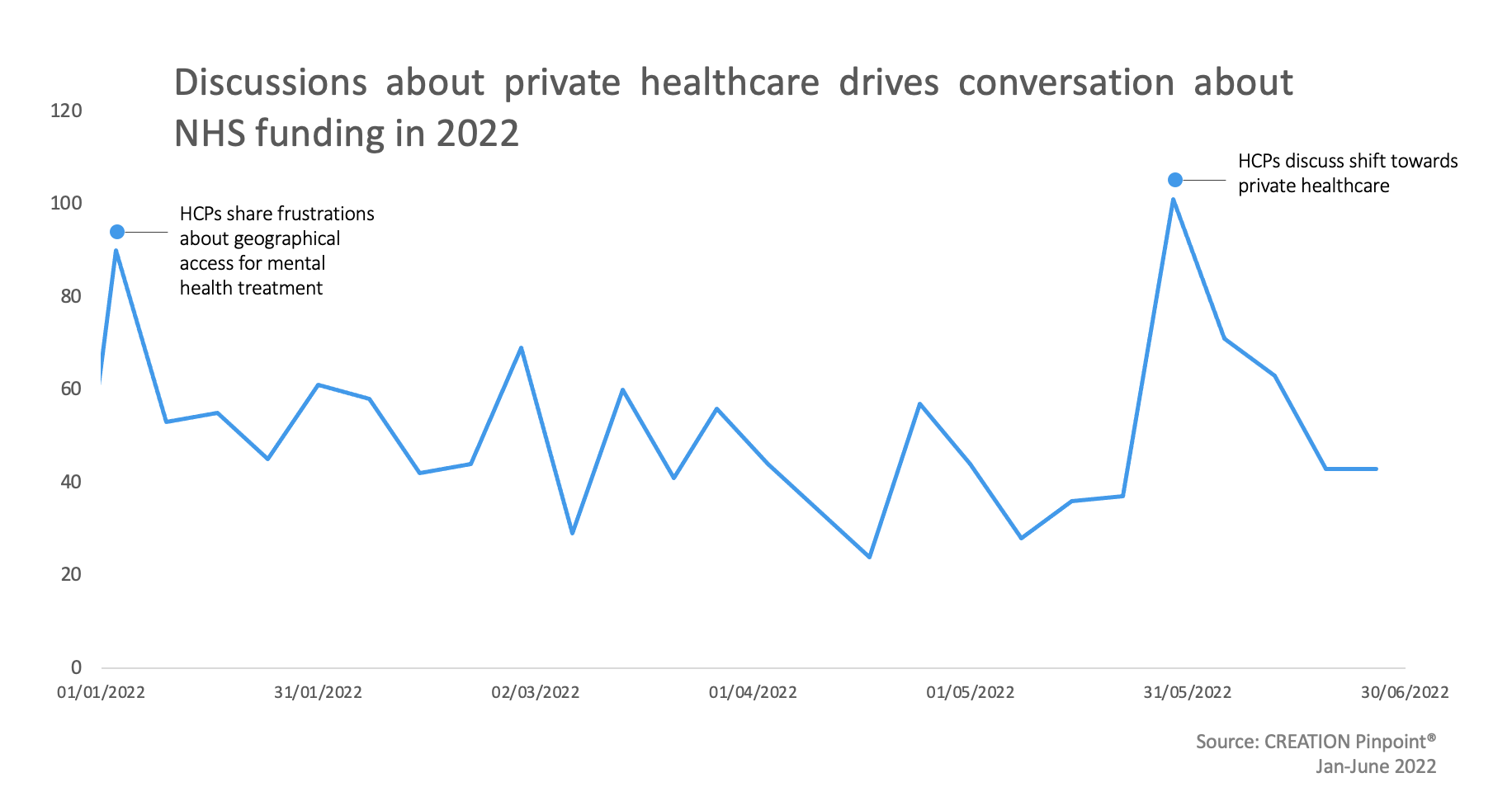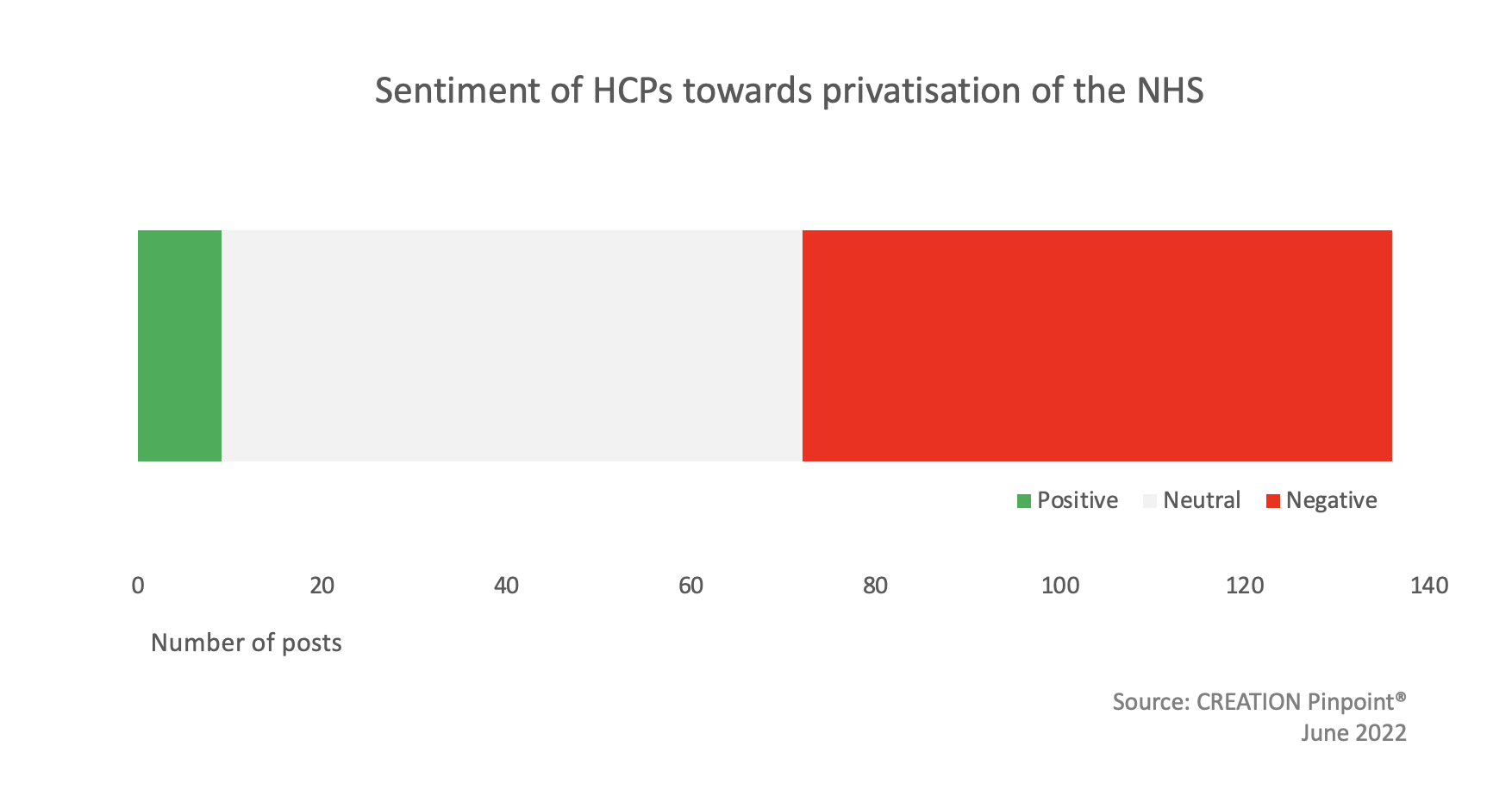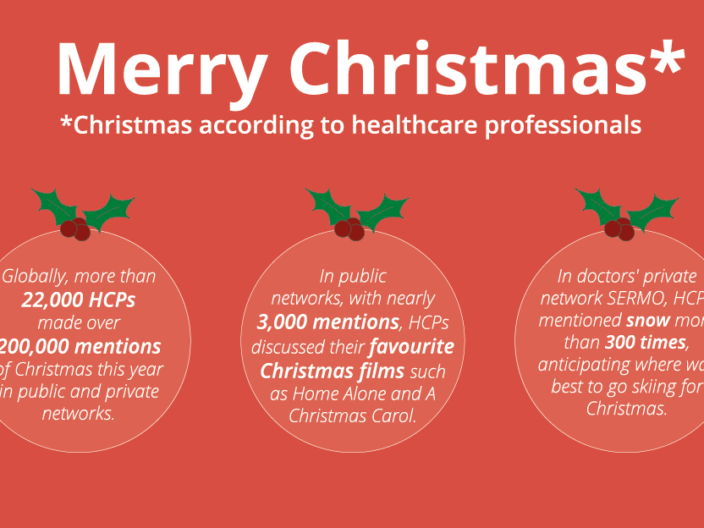The NHS is the second-largest single payer healthcare system in the world, coming only under Brazil, and has long been heralded as one of the best healthcare systems. The NHS is frequently held in comparison to large private healthcare systems such as in the US, and the benefits of better patient access to diagnosis and treatment cannot be overlooked.
CREATION.co analysed the conversations of UK healthcare professionals over the course of 2022 to discover healthcare professionals’ (HCPs’) needs and opinions, in relation to NHS funding. Since the beginning of 2022, CREATION.co has identified 1,332 posts by 964 HCPs discussing issues surrounding NHS funding.
Privatisation of the NHS unwanted by HCPs

The most significant driver of conversation was discussion surrounding private healthcare and the privatisation of the NHS. This was directed by frustrations around waiting times in the NHS, as expressed by a well received tweet by GP Dr. Neena Jha, which has accumulated more than 2,000 retweets and 7,500 likes, in which she shared her observation of patients having to turn to private healthcare due to the extended suffering they have to endure:
In my 8 years as a GP, I’ve never seen so many patients accessing private health care as right now
They have no choice
They can’t wait > 1 yr for surgery/hosp clinic. They can’t keep living with such suffering for so long
The NHS cuts are causing untold harm!
— Neena Jha (@DrNeenaJha) June 1, 2022
In discussing the private healthcare issues, HCPs shared their views on the seeming shift towards privatisation of the NHS, which were overwhelmingly negative, stemming from concerns for their own and their patients’ ability to afford private healthcare.

Scottish nurse Gillian MacArthur responded to a tweet highlighting that healthcare in Scotland is not free but comes at the expense of higher taxes, stating that she’d rather have higher tax than pay £40 per consultation under private healthcare:
I suggest you check out Westminster plans to accelerate the NHS Bill plans to privatise the NHS and make it law. I’d rather pay a slightly higher tax than have private healthcare. But maybe you can afford £40 per consultation before any investigation or treatment. Good for you.
— Gillian MacArthur💙🇺🇦🌻🏴 (@gillmac1) April 28, 2022
Pharmacist Lisa Jamieson shared a thread on her experience with the ‘broken’ NHS system while expressing that NHS privatisation is not the answer because of cost and access issues:
3. ‘Going private’ when there are long NHS waiting lists isn’t the easy option that a lot of people think it is. Some treatments are not available privately – insurers won’t cover them – so will need to be self-funded. Access to a multidisciplinary team may not be an option. /25
— Lisa Jamieson (@LoveInYourTummy) April 23, 2022
HCPs highlight mental health treatment access issues
HCPs also discussed access issues for specific diseases, one key area being mental health treatment. 22 UK HCPs shared Shadow Cabinet Minister for Mental Health Dr. Rosena Allin-Khan’s tweet discussing the difficult geographical access patients face in obtaining mental health treatment, calling it a ‘postcode lottery of service provision’.
Hundreds of people are being sent hundreds of miles away from home for mental health treatment. It costs the NHS £2.5 million a week and is painful for patients and their families.
We must end the postcode lottery of service provision.https://t.co/uLfQg7YZxK
— Dr Rosena Allin-Khan (@DrRosena) January 3, 2022
HCPs also commented on the Improving Access to Psychological Therapies (IAPT), also known as ‘Talking therapies’, an NHS programme aimed at treating and managing mental health issues characterised by evidenced-based psychological therapies, routine outcome monitoring, and regular and outcomes focused supervision. HCPs were largely negative about this programme, citing its inferiority to traditional counselling which has longer term benefits.
The NHS programme Improving Access to Psychological Therapies (IAPT) was designed to fill the gap in NHS provision for psychological therapy, but it’s short-term ‘fixes’ have been sold as a panacea for mental health problems.
— Duncan Double (@DBDouble) January 21, 2022
@InsightIAPT what are patients supposed to do if they want to access 'paid for' counselling/psychotherapy instead of 'paid for' IAPT/CBT treatments? I'm referring to the NICE patient choice options. There are 50,000+ fully trained registered counsellors already available.
— Glenna Demeter (@Glennademeter) January 20, 2022
HCP concern about access to COVID-19 antivirals
Unsurprisingly, COVID-19 has had a strong impact on funding discussions among HCP online. In particular, HCPs were vocal about patient access to COVID-19 antivirals through the NHS. Several HCPs retweeted Guardian journalist Frances Ryan’s tweet sharing an article that highlighted the struggle for cancer patients who are seriously ill due to their inability to obtain COVID-19 antiviral drugs.
@InsightIAPT what are patients supposed to do if they want to access 'paid for' counselling/psychotherapy instead of 'paid for' IAPT/CBT treatments? I'm referring to the NICE patient choice options. There are 50,000+ fully trained registered counsellors already available.
— Glenna Demeter (@Glennademeter) January 20, 2022
Professor of Primary Care and Public Health, Professor Azeem Majeed, directed a critical tweet towards the NHS suggesting there is the potential for health inequalities to worsen if those who are poor or in minority groups struggle to access COVID-19 antivirals:
A reminder for NHS England. If there are obstacles and delays in accessing antiviral drugs for Covid-19, this will exacerbate health inequalities as it is poorer groups, minorities and people who are less well-educated who will struggle to navigate the system to obtain treatment.
— Professor Azeem Majeed (@Azeem_Majeed) June 21, 2022
Continue to monitor the NHS funding conversation
The NHS has proven over time that its renown worldwide as one of the best healthcare systems is deserved, but growing talks about privatisation and the struggles caused by lack of funding has not escaped HCPs’ online discussions. As the UK government continues to discuss the future of the NHS, it is inevitable that HCPs will be increasingly vocal about funding and access issues plaguing the NHS. CREATION.co will closely monitor the conversation to uncover HCPs’ views. To keep up to date with how this and HCP online conversation impacts healthcare and the pharmaceutical industry, sign up to our monthly eJournal.
 By Francesca Gan
By Francesca Gan 



